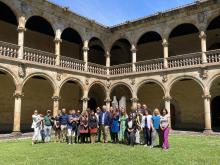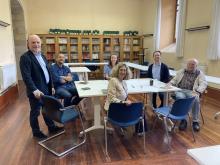Opening the Black Box of International Criminal Investigations: Challenges of Culture and Practice
Coordinators: Annelies Vredeveldt (Vrije Universiteit Amsterdam), Nandor Knust (UiT The Artic University of Norway ), Dylan Drenk (Vrije Universiteit Amsterdam), Jack Staniland (Griffith University )
Description of the meeting
Over the past decades, international criminal justice has exponentially grown. New institutions were established to address gross human rights violations and atrocity crimes, and bring perpetrators to justice. These institutions have faced huge challenges in investigating these crimes in war-torn countries, devastated communities, and with traumatised victims, while often working in a foreign cultural context. The investigations have been extensively criticised by courts and judges, and investigators more generally for failing in their practices. This workshop aims at bringing together experts on the practice of investigative interviewing with experts on and practitioners in international criminal justice, to address these numerous problems.
These are challenges beyond the investigative practices in national jurisdictions: they include the multitude of victims and perpetrators, the continuity of atrocities in on-going conflicts and between warring parties, the organised context in which perpetrators act, and (often) the implication of authorities and criminal justice personnel (e.g. police) in the crimes. Because of the nature of atrocity crimes, and the environment in which they occur, interviewing (victim)-witnesses is especially difficult.
These problems are exacerbated by the overarching effect of a particular cultural context on these investigations. The inherent international nature of the investigations potentially can antagonize those of the local culture. To lay charges beyond reasonable doubt investigations need reliable evidence, yet this essential need for sound evidence, and what that entails, is understood to varying extents by different cultures. Attention to details (e.g. time, number of perpetrators, relationships) changes between cultures, meaning that recollections during interviews - and their subsequent value for the investigations - also differ as a function of culture. Furthermore, cultural differences between investigators and local people – be they victims, witnesses, perpetrators or professionals - can foster a sense of distrust between them. Indeed, many aspects of international criminal investigations are affected by different cultural norms, expectations and taboos, all of which can impact on the investigation.
However, surprisingly little is known about the nature, mechanisms and success of investigations beyond national jurisdictions. It is the aim of the workshop to open this “black box” and shine a light onto the particular practices and confront these with research findings and good practice developed in domestic contexts. The complexity of the issues surrounding these investigations requires an interdisciplinary approach, as well as exchange between practitioners and researchers. This workshop therefore brings together researchers from law, criminology, psychology, and sociology to attain the greatest possible understanding on international criminal investigations.
The workshop addresses the following key themes and questions:
- What are the challenges faced by international investigations and how are they addressed in present practices?
- How do these practices compare to scientific knowledge and research gauged from national jurisdictions and institutions, and how can they be improved, e.g. interviewing eyewitnesses/victim-witnesses?
- How do culture and cultural norms influence investigations and their results, e.g. eyewitness memory, testimony, etc.?
- What are the problems of intercultural communication between judicial officers at international tribunals and witnesses/victims of atrocities, and how can intercultural communication be strengthened?
Our experience in Oñati
As part of the project on Eyewitness Memory in Cross-Cultural Contexts, ALLP members Annelies Vredeveldt, Dylan Drenk and Maria Shenouda, along with Jack Staniland (Griffith University) and Nandor Knust (UiT The Artic University of Norway), organized an inspiring and interactive workshop in Oñati, Spain.
The workshop was titled ‘Opening the Black Box of International Criminal Investigations: Challenges of Culture and Practice’ and took place at the historical International Institute for the Sociology of Law in Oñati, Gipuzkoa, Spain.
Practitioners from various areas in the field, such as lawyers, prosecutors and psychosocial experts, as well as researchers from a wide range of backgrounds and universities were involved.
Participants presented about their topics of expertise within the realm of the workshop. Topics discussed included ‘Culture and international investigations’, ‘Eyewitness memory in cross-cultural contexts’, ‘Memory and trauma in investigative interviews’ and many more.
The wide range of backgrounds, as well as combination of researchers and practitioners led to very fruitful discussions and exchange of information, where practitioners were able to expand their views to incorporate empirical takes on their field and the researchers were able to get a first-hand account of what obstacles the practitioners face and what research could focus on more.
To wrap up the two-day workshop there was a roundtable to gather input on a new ALLP investigative interviewer training program developed by postdoc Fenia Ferra and Annelies Vredeveldt. Participants were given the chance to design their own training, incorporating all the issues explored during the previous two days, and were then asked to provide feedback on the preliminary plans for the ALLP training program.
Overall, it was a successful and engaging workshop, in which participants were able to help bridge the gap between research and practice while enjoying the occasional traditional Txakoli food and wine.
Workshop Coordination Team
Avenida de la Universidad, 8
Apartado 28
20560 Oñati (Gipuzkoa) - Spain
T: +34 943 78... Ver teléfono
E: workshop@iisj.es






